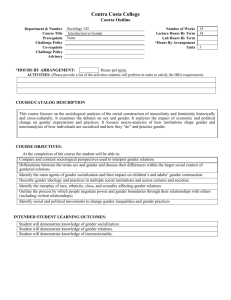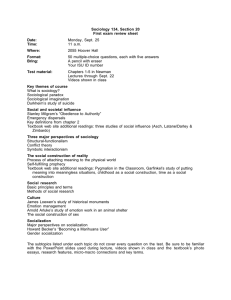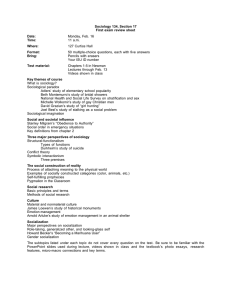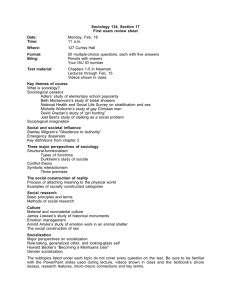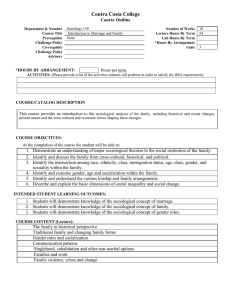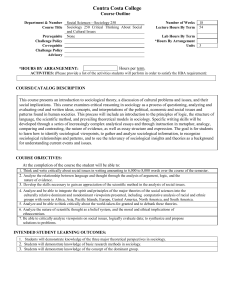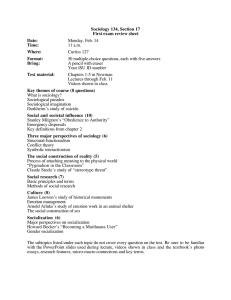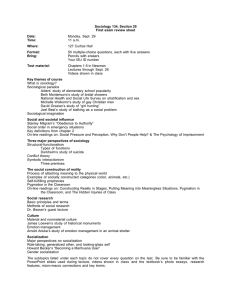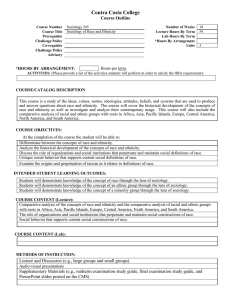SOCIO 220-S14.doc 95KB May 16 2014 01:49:20 PM
advertisement
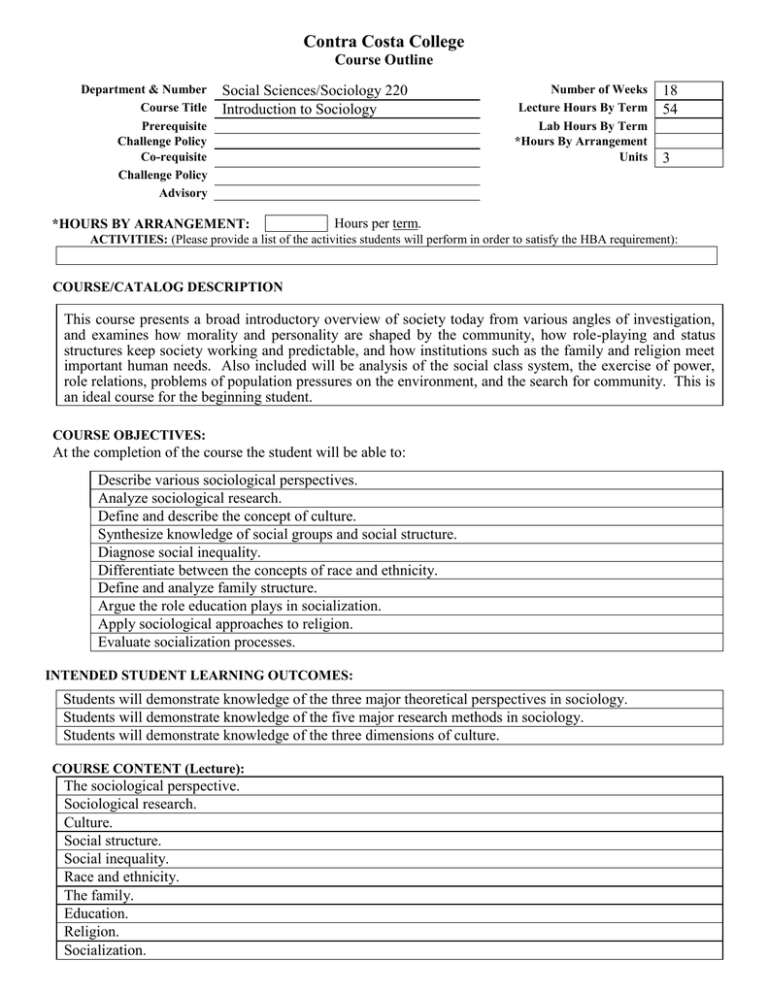
Contra Costa College Course Outline Department & Number Course Title Prerequisite Challenge Policy Co-requisite Challenge Policy Advisory Social Sciences/Sociology 220 Introduction to Sociology *HOURS BY ARRANGEMENT: Number of Weeks Lecture Hours By Term Lab Hours By Term *Hours By Arrangement Units 18 54 3 Hours per term. ACTIVITIES: (Please provide a list of the activities students will perform in order to satisfy the HBA requirement): COURSE/CATALOG DESCRIPTION This course presents a broad introductory overview of society today from various angles of investigation, and examines how morality and personality are shaped by the community, how role-playing and status structures keep society working and predictable, and how institutions such as the family and religion meet important human needs. Also included will be analysis of the social class system, the exercise of power, role relations, problems of population pressures on the environment, and the search for community. This is an ideal course for the beginning student. COURSE OBJECTIVES: At the completion of the course the student will be able to: Describe various sociological perspectives. Analyze sociological research. Define and describe the concept of culture. Synthesize knowledge of social groups and social structure. Diagnose social inequality. Differentiate between the concepts of race and ethnicity. Define and analyze family structure. Argue the role education plays in socialization. Apply sociological approaches to religion. Evaluate socialization processes. INTENDED STUDENT LEARNING OUTCOMES: Students will demonstrate knowledge of the three major theoretical perspectives in sociology. Students will demonstrate knowledge of the five major research methods in sociology. Students will demonstrate knowledge of the three dimensions of culture. COURSE CONTENT (Lecture): The sociological perspective. Sociological research. Culture. Social structure. Social inequality. Race and ethnicity. The family. Education. Religion. Socialization. COURSE CONTENT (Lab): METHODS OF INSTRUCTION: Lecture and Discussion (e.g., large groups and small groups) Audio-visual materials (e.g.,PowerPoint) Cooperative Learning Videos and Films INSTRUCTIONAL MATERIALS: NOTE: To be UC/CSU transferable, the text must be dated within the last 7 years OR a statement of justification for a text beyond the last 7 years must be included. Textbook Title: Author: Publisher: Edition/Date: Justification Statement: Textbook Reading Level: Sociology in a Changing World William Kornblum Thomson Wadsworth 9th Edition 2012 (For textbook beyond 7 years) College Lab Manual Title (if applicable): Author: Publisher: Edition/Date: OUTSIDE OF CLASS WEEKLY ASSIGNMENTS: Title 5, section 55002.5 establishes that a range of 48 -54hours of lecture, study, or lab work is required for one unit of credit. For each hour of lecture, students should be required to spend an additional two hours of study outside of class to earn one unit of credit. State mandates that sample assignments must be included on the Course Outline of Record. Outside of Class Weekly Assignments Hours per week Weekly Reading Assignments (Include detailed assignment below, if applicable) 2 Example #1 – Read: Chapter 1 in the textbook. Example #2 – Read: Chapter 2 in the textbook. Weekly Writing Assignments (Include detailed assignment below, if applicable) 2 Example #1 -- Write a critical analysis reaction paper on the film Banished. You must address the 10 questions listed on the hand-out and it must be in the format outlined in the hand-out. Example #2 -- Write a critical analysis reaction paper on the film Lone Star. You must address the 10 questions listed on the hand-out and it must be in the format outlined in the hand-out. Weekly Math Problems (Include detailed assignment below, if applicable) Lab or Software Application Assignments (Include detailed assignment below, if applicable) Other Performance Assignments (Include detailed assignment below, if applicable) Review sociological issues in the media. 2 STUDENT EVALUATION: (Show percentage breakdown for evaluation instruments) Course must require use of critical thinking, college-level concepts & college-level learning skills. For degree credit, course requires essay writing unless that requirement would be inappropriate to the course objectives. If writing is inappropriate, there must be a requirement of problem-solving or skills demonstration. 33 % Essay (If essay is not included in assessment, explain below.) 67 % % % Computation or Non-computational Problem Solving Skills Skills Demonstration Objective Examinations Other (describe) % % % GRADING POLICY: (Choose LG, P/NP, or SC) Pass / No Pass X Letter Grade 90% - 100% = A 80% - 89% = B 70% - 79% = C 60% - 69% = D Below 60% = F 70% and above = Pass Below 70% = No Pass Prepared by: J. Vern Cromartie Date: April 21, 2014 Revised form 01/14 Student Choice 90% - 100% = A 80% - 89% = B 70% - 79% = C 60% - 69% = D Below 60% = F or 70% and above = Pass Below 70% = No Pass
